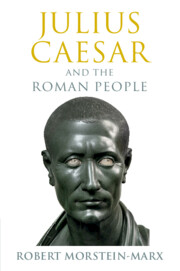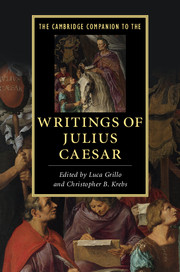Julius Caesar and the Roman People
Julius Caesar was no aspiring autocrat seeking to realize the imperial future but an unusually successful republican leader who was measured against the Republic's traditions and its greatest heroes of the past. Catastrophe befell Rome not because Caesar (or anyone else) turned against the Republic, its norms and institutions, but because Caesar's extraordinary success mobilized a determined opposition which ultimately preferred to precipitate civil war rather than accept its political defeat. Based on painstaking re-analysis of the ancient sources in the light of recent advances in our understanding of the participatory role of the People in the republican political system, a strong emphasis on agents' choices rather than structural causation, and profound scepticism toward the facile determinism that often substitutes for historical explanation, this book offers a radical reinterpretation of a figure of profound historical importance who stands at the turning point of Roman history from Republic to Empire.
- Rejects teleological explanations of Caesar's rise or of the crisis of the Republic
- Re-orients the perspective from which major events are told from the traditional aristocratic viewpoint which emphasizes the dominance of the Senate to a 'popular' viewpoint which emphasizes the power and sovereignty of the People
- Offers a timely reflection on the development of a devastating political crisis caused by intense polarization and norm-breaking, leading to justified fear and pre-emptive aggressive action
Reviews & endorsements
‘Highly recommended.’ R. T. Ingoglia, Choice Magazine
‘What Morstein-Marx attempts here is nothing less than a reset of earlier thinking about the end of the Republic and Caesar’s role in its downfall.’ Michael Fallon, Classics For All
'Morstein-Marx is a splitter, and an excellent one. His command of the details is marvelous. The book offers many powerful reinterpretations of oft-told tales, such as Caesar’s march across the river that served as a boundary between Rome and its northern territories, the Rubicon.' Barry Straus, Claremont Review of Books
‘You have to look elsewhere for a quick overview, because Morstein-Marx takes you into the depths of the rabbit hole. However, he conducts this discussion so comprehensively that it must be the starting point for further research. Instead of reading many works, the first address for a serious discussion of the late Roman Republic can now be found here.’ Bastian Schenk, H-Soz-Kult
Product details
August 2021Adobe eBook Reader
9781108950244
0 pages
This ISBN is for an eBook version which is distributed on our behalf by a third party.
Table of Contents
- 1. Introduction
- 2. The Early Caesar
- 3. Caesar's 'Entry into History': The Catilinarian Debate and Its Aftermath
- 4. Caesar's First Consulship
- 5. Caesar in Gaul: The View from Rome
- 6. No Return: Caesar's Dignitas and the Coming of the Civil War
- 7. Taking Sides
- 8. Caesar's Leniency
- 9. En route to the Parthian War
- 10. Conclusion





